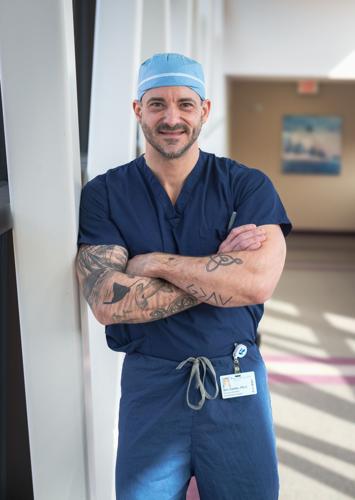TRAVERSE CITY — An enemy drone attacked U.S. troops in Jordan on Jan. 24, claiming the lives of three U.S. Army soldiers and injuring another 40.
The attack took place at a small installation known as Tower 22, according to U.S. officials. The drone hit the outpost, where trailers holding sleeping soldiers sustained the brunt of the strike.
This week, the Pentagon identified those killed in the attack as Sgt. William Jerome Rivers, 46, of Carrollton, Ga.; Spc. Kennedy Ladon Sanders, 24, of Waycross, Ga.; and Spc. Breonna Alexsondria Moffett, 23, of Savannah, Ga. All three served in the the 718th Engineer Company out of Fort Moore, Ga.
For Benjamin Sattler, that tragedy couldn’t have hit any closer to home.
The 40-year-old Traverse City physician’s assistant works at Munson Medical Center where he splits his time between the intensive care unit and the operating room. But when he’s not in scrubs, Sattler is kitted up in army fatigues, with a full combat load and medical bags.
Sattler served in the Michigan Army National Guard for the last six years, working as a medical officer with the 107th Engineer Battalion out of Ishpeming. His unit just returned from the Middle East in November. For the six months spent working out of Central Command, his unit conducted operations in various nations, including Qatar, Saudi Arabia, Iraq, Kuwait, Syria and Jordan, as well as others.
Before returning to the United States, Sattler’s unit was tasked with helping the 718th Engineer Company, which was just coming onboard in Jordan, learn the ropes at the Tower 22 installment.
“The 718th fell under our battalion, so we got to know the soldiers, the staff, and work alongside them,” he said.
The news came last weekend that the 718th Engineer Company lost three soldiers to the drone attack hit hard.
“My first thought was that I was heartbroken, and of course, that couldn’t been any one of our own in the 107th,” Sattler said.
The primary objective of Sattler’s unit, as the engineer battalion in Central Command (CENTCOM), included building recreation facilities, barracks, facilities, missile platforms and other projects throughout the Middle East.
He and his team kept an eye on soldiers’ physical and mental well-being wherever they were sent. As the chief medical officer, he worked in medical and medivac (medical evacuation) training, plus suicide ideation and behavioral health.
Sattler said servicemen and women, in-country, deal with various mental health challenges — especially as they encounter traumatic events.
“I can’t imagine what they’re going through now,” he said.
Leading up to his unit’s departure, Sattler said that the disposition changed when the Israel-Hamas attacks took place in October.
“At that point, we went into more of a defensive posture,” he said. “We weren’t necessarily surprised when things escalated, because things can change at any given moment. But there were already attacks taking place all around the Middle East. But when that war started, the whole attitude changed.”
Part of the defensive stance included taking cover for extended periods of time, and waiting for attacks to take place.
“We didn’t think we were going to be able to make it home,” Sattler said. “When the other battalion came on deck, we were thinking ‘great, now we have two’, but if things go south ... they’re probably going to keep up us here until they can get another battalion-sized element to come over and replace us.”
He said that they were ready and willing to do so if called upon.
According to a report by U.S. officials, it appeared that the enemy drone that attacked the installation may have been mistaken for an American drone returning to base, as it was flying low when it was nearby.
Therefore, there was no effort to shoot down the drone. There are no large air defense systems at Tower 22, however the base does have counter-drone systems. Pentagon spokeswoman Sabrina Singh said that the U.S. Central Command was still assessing the matter.
“This whole thing last Sunday ... it was upsetting because it hit close to home. We knew them well enough. We spent time at Tower 22 to evaluate some of the projects that were taking place,” Sattler said.
“I have a strong faith background ... and I believe it’s by the grace of God that I’m here, and that we were able to take care of the soldiers that we had to a certain degree that nobody got hurt.”
Sattler said his hope is that families back home in the United States realize that the work of the many men and women, especially those who lose their lives, is not in vain.
“We’re building relationships over there with people in every country we work in,” he said. “Whenever something like this happens, it just breaks your heart. We know the risk going into it, but to have that happen so close to home ... it’s just surreal.”






















